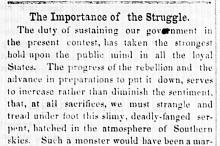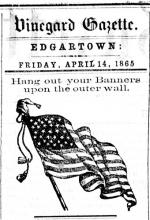While the dedication of the Confederate Memorial tablet was planned as a part of the Oak Bluffs Celebration, it seemed that the fates must have willed that a day be set apart for the ceremony alone, as the heavy electrical storm on Friday prevented the carrying out of any other part of the day’s program, other than the Fireman’s Parade which took place just before dark.
Owing to the sudden death of Judge Hillman, Herbert N. Hinckley was chosen as master of ceremonies, and read the speech which the Judge had prepared for the occasion.
None could have heard the speech without realizing that the words came from the heart of a man who had met and battled with a foe, and who had been impressed by his foeman’s chivalry.
“The statue of George Washington stands in London, shall we be less forgiving than England?” was one sentence which stood out prominently, and: “I pity any man or woman who cannot forgive and forget,” showing the generous nature of the grand old veteran toward those whom he honored for upholding the cause in which they believed.
Near the close of the speech, the tablet was unveiled by George Phillips, Commander of the Governor Mayhew Post of the American Legion, and the closing words of the speech were: “As far as we are concerned the chasm is closed.”
Charles A. Strahan, donator of the monument, next addressed the assembly. Calling on each patriotic organization by name, and on the public as a whole, he delivered to each a personal charge, and commendation.
“This is a patriotic event which has no counterpart in the United States,” said he. “I was the first Confederate soldier to honor the Northern people, and the people of Martha’s Vineyard are the first to honor the Confederate soldier.”
“If transportation facilities had been the same as of today, during the years previous to 1860, there would have been no war,” he continued. “The people of the North and South had no opportunity to get acquainted, or to gain an understanding of each other.
“As it is, the South regards their own defeat as a blessing in disguise, realizing that a victory for the seceders, would have meant further secession as the country developed.
“Keep the Union for the future generations,” he told the American Legion. “Combat the Soviet element which aims at the overthrow of our government, and don’t look to the Grand Army or the veterans of the Confederacy for aid, they are growing fewer each year. It is your fight, carry it on.”
Thanking the organizations for having the tablet inscribed “In Honor of the Confederate Soldiers,” rather than a single name, he said that if the choice of a single name had been left to him he would have chosen that of Robert E. Lee.
At the close of Mr. Strahan’s speech, the band played Dixie and a few rebel yells were heard among the general applause.
Other speakers were: Hon. H. K. Braley, Justice of the Supreme Court of Massachusetts; Mrs. Armstrong Swartmont of Brookline, representing the United Daughters of the Confederacy; Mrs. Sydna Eldridge, Past President of the Woman’s Relief Corps of the Henry Clay Wade Post Auxiliary, who was introduced as “The Mother of All Soldiers,” and Mrs. Alice Chesney of Cambridge, corresponding secretary of the United Daughters of the Confederacy.
Following the dedication ceremony, John F. McGrath gave a brief address on the historical event, the one hundred and fiftieth anniversary of which has been observed by the celebration.
Stating that the first naval battle of the Revolution had waited 150 years for recognition, he added that history had neglected Capt. Nathan Smith, and that he hoped that the gallant soldier might be honored yearly.
After which Mr. McGrath introduced Charles H. Brown, a lineal descendant of Capt. Smith, who related much that history and tradition had recorded of that figure in Vineyard history.










Comments